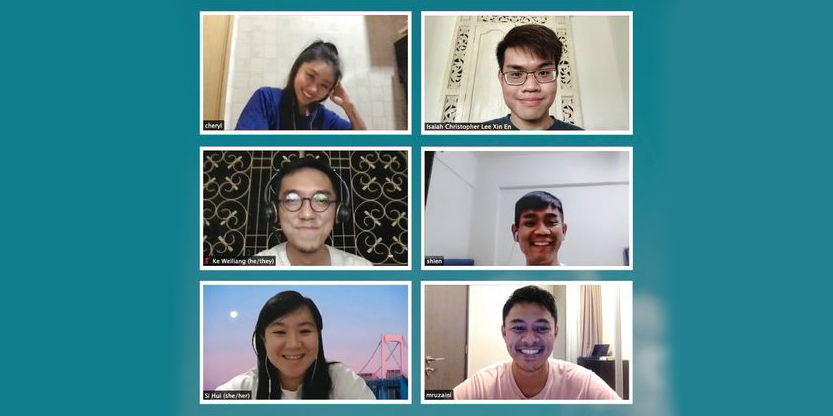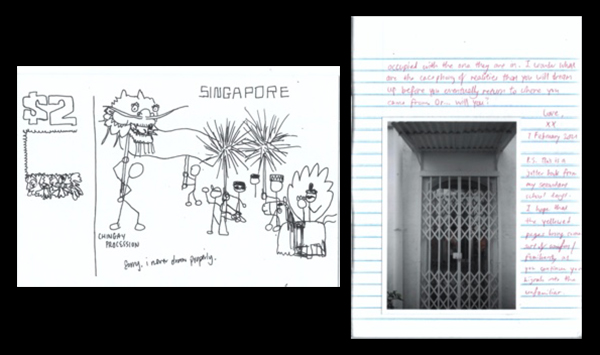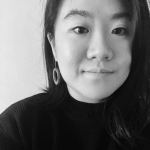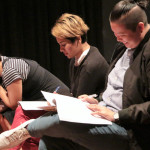
The Vault: Lite artists: (from top left) Cheryl Tan, Isaiah Lee, Ke Weiliang, Lim Shien Hian, Lim Si Hui, and Ruzaini Mazani.
Since the beginning of 2021, the artists-in-residence of The Vault: Lite have been researching and developing responses to the plays they have selected, under the overarching theme “A Whole New World” inspired by monumental changes to human lives brought on by the COVID-19 pandemic. Over the course of eight weeks, they have been conceptualising and devising, and conducting research, interviews and play-tests. As we look forward to their final sharings on 28 Feb, let’s find out more about six Vault: Lite artists about their motivation and vision behind their projects.
Les autres Latifahs
by Ruzaini Mazani
Ruzaini Mazani is responding to the monodrama La Libre Latifah written by Aidli ‘Alin’ Mosbit. La Libre Latifah was first performed in 2003 as part of Teater Ekamatra’s Projek Suitcase showcase series featuring local and regional contemporary Malay plays.
What drew you to the text you selected?
I realised the text was not performed a lot. It was staged twice in 2003 – at the Esplanade and in Stor Teater, Kuala Lumpur – and had a recent revival in 2020 during Circuit Breaker by RUMAH by Khai. Even so, the latter was a performance of one of the monologues in the play. Then I thought, “why not revisit this play? I’ve always liked Kak Alin’s works. Let’s see what happens when I approach it.
How did the idea for your response come about?
As I was reading the play, I was drawn to the idea of nostalgia and nostalgia-making, especially in the current context of COVID-19; there was an air of “good old times” during the lockdown. It opened up the possibilities that nostalgia isn’t purely a “warm and fuzzy feeling”, but something to do with performing a memory for a particular purpose instead.
What are you exploring with your response?
I’m experimenting with the philosophy of nostalgia and the performance of self from La Libre Latifah. I am curious to know where ‘nostalgia’ can take me creatively, and performance ideas that can be inspired from it. I’m hoping to get materials for a possible expansion of Latifah or excavation of Latifah’s lives. If possible, I would like to write a sequel about Latifah (heehee).
Those Who Can’t, Teach: An Interactive Fiction Piece
by Lim Shien Hian
Lim Shien Hian is responding to Haresh Sharma’s Those Who Can’t, Teach, the 1990 play about Mrs Phua Su Lin, a secondary school teacher and single mother who is challenged by the demands of both roles. In his response, he is reimagining Those Who Can’t, Teach as an Interactive Fiction piece set in COVID-era Singapore.
What drew you to the text you selected?
I wanted to look at a play where the central experience has been radically transformed by COVID-19. I then had a chance conversation with a teacher friend about their tough experience dealing with their students during the Circuit Breaker. I thought, there must be many horror stories of teaching and learning during the lockdown, what better plight to throw the teachers and students of Those Who Can’t, Teach into?
How did the idea for your response come about?
The format came first – I learned about Interactive Fiction in a module at university, and then was wowed by games such as Detroit: Become Human and Disco Elysium. While not technically Interactive Fiction, their stories are so rich and integral to the whole game experience that I wanted to see if the same could be applied to plays.
What are you hoping to explore through this response?
Marrying the play and the format, I want to see how Su Lin, the main teacher figure of Those Who Can’t, Teach, would navigate COVID-19 and the lockdown. For such a hands-on teacher who is always concerned about her students (perhaps, a little too much so) the whole situation must have impacted her mentally, or perhaps strengthened her resolve to care for them. Would she come up with innovative ways to engage her students over Zoom?
Rehearsals for (Im)permanence
by Cheryl Tan and Isaiah Lee
Cheryl Tan and Isaiah Lee are responding to POOP! written by Chong Tze Chien. First staged in 2009 by The Finger Players, POOP! explores death and grief in the story of a grandmother, whose own son had committed suicide, and whose granddaughter contracts a terminal illness. Rehearsals for (Im)permanence re-imag(in)es post-traumatic healing after the loss of a loved one, and the ways in which one perceives life and the afterlife.
What drew you to the text you selected?
We actually met during the 2015 M1 Peer Pleasure Youth Theatre Festival in which our schools were participating, and Cheryl was playing Emily in her school’s production of POOP!. This play has stuck with us over the years because of its relatable tenderness and fresh take on what it means to lose the people we love.
How did the idea for your response come about?
The play’s language is poetic in its imaginings of the afterlife and its spiraling cyclicality, yet the simple and profound message is that grief is a non-linear process that begs constant re-evaluation. There are also many sidelined (or perhaps subaltern) voices that have yet to be explored in the play. Thus, we were drawn to work with the original material to expand its meaning and explore the intersection between loss and love.
What are you hoping to explore through this response?
POOP! explored what it means for the living to have been left behind; we hope to shed light on the flip-side and explore what it means for the departed to leave people behind. We are also exploring several aspects of performance art and audience participation and how it may be integrated into theatre.
Bodies in Community
by Lim Si Hui
Lim Si Hui is responding to Ovidia Yu’s Breastissues, a play about four women who experience various challenges with their breasts. Breastissues was first staged in 1997 by Singapore Repertory Theatre. For her response, Si Hui zeroes in on women’s experiences of breast cancer, and is seeking to understand how the themes and interactions from the play can be further experienced and expanded upon during a health crisis.
What drew you to the text you selected?
I was drawn to Breastissues, as it focuses on major changes to the female body (pregnancy, breast cancer, breast augmentation). I was also struck by the keen urgency of making a decision about one’s body with the input of community, and the fraught relationship between bodily changes and shared emotion. I have a personal family history of breast cancer as well, and the topics of feminine presentation and reproduction has been of keen interest to me for the last couple years.
How did the idea for your response come about?
Women have always lived with judgment on bodily changes, whether visible or invisible. The current COVID-19 pandemic also illustrates how changes in the larger community ties closely with one’s personal experience. Our lives are informed by the opinions, emotions and decisions of others.
What are you hoping to explore through this response?
At the heart of my response is the urge to explore the connections that underscore a crisis of the human body, no matter what form it takes.
Letters to/from Rosnah
by Ke Weiliang
Ke Weiliang is responding to the Haresh Sharma monodrama Rosnah. First staged by The Necessary Stage in 1995, Rosnah is the coming-of-age story of a young Malay Muslim woman studying in London. For Letters to/from Rosnah, Weiliang is working with artists Tysha Khan and ila to embody two different versions of the titular character, and he engages with the two Rosnah’s through the act of letter-writing. [At the time of publication, the letter exchange is ongoing and expected to be completed in Mar 2021. You can view the letters here.]
What drew you to the text you selected?
My first encounter with Rosnah was the 2016 staging at the Esplanade Theatre Studio, during the Pesta Raya festival. I was struck by how Rosnah struggled with her personal identity in an increasingly intersectional world, and how actress Siti Khalijah Zainal fluidly alternated between playing Rosnah and being herself to provide meta-commentary on Rosnah’s journey. It made me wonder if Rosnah and people living in the present could have a time capsule-like conversation about some of the relatively dated, yet relatable issues brought up by the play.

Two examples of letters sent between the Rosnah’s and Weiliang. You can view all the letters here.
How did the idea for your response come about?
Being stripped of regular close contact because of COVID-19 made me curious about the possibility of fostering intimacy over scattered, physically distanced interactions – without defaulting to digital communication. I gradually became fascinated with sending letters and postcards to loved ones whom I could no longer readily meet.
I was also inspired by Teo Xiao Ting’s response to The Necessary Stage’s 2019 staging of Off Centre, where she framed her review as a letter addressed directly to the play’s protagonists, Saloma and Vinod. It made me dream of the possibility of similar interactions happening between audience members and a legacy character from a text-based play.
What are you hoping to explore through this response?
By the end of my letter exchanges with both Rosnah’s, I am hoping to get a better sense of whether there is a future for scattered, physically distanced theatrical experiences that do not require artists and audience members to share the same physical and/or digital space in real time.
By Lee Shu Yu & Daniel Teo
Published on 24 February 2021
The Vault: Lite is the exploratory arm of The Vault, aimed at the experimenting and ideating of contemporary responses to works from the Singapore theatre canon.





